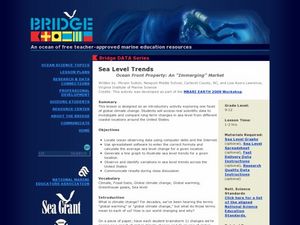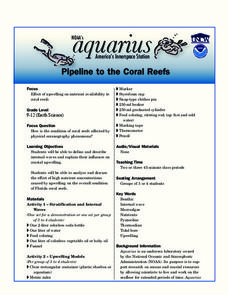Curated OER
Ecosystems
In this ecosystems worksheet, students complete a crossword puzzle with 35 questions about the different types of ecosystems and organisms in them.
Curated OER
Imagine a Kelp Forest
Young scholars write a story based on their research of the kelp forest. In this ecosystem lesson, students view a video and research the kelp forest ecosystem. They write a short story imagining the discovery of a new species in the...
Curated OER
Myth-try Cards Activity
Students read creation myths to learn various cultural explanations for natural phenomena. They select sharks and write myths to explain physical structures, behaviors or roles in ecosystems. They research the animals to provide...
Curated OER
Visual Vocabulary
Students interpret and name the vocabulary termed acted out by the mime. In this science/language arts/physical education lesson plan, students are given a set of vocabulary terms to discuss within their group. Next, students place all...
Curated OER
It Looks Like Champagne
Students determine some practical implications of the discovery of liquid carbon dioxide in deep-ocean ecosystems. They interpret phase diagrams and explain the meaning of "critical point" and "triple point."
Polar Trec
Bering Sea Fabulous Food Chain Game
In spring, the Bering Sea turns green due to phytoplankton, which live at the surface, experiencing a population explosion. Groups of scholars play a food chain game, writing down food chains as the game is played. After five to six...
Forest Foundation
The Web of Life
Producers, herbivores, carnivores, omnivores, decomposers. To begin a study of the forest ecosystem, learners examine the connections among the members of ecological communities.
Consortium for Ocean Science Exploration and Engagement (COSEE)
Arctic Smorgasbord
Though the walrus spends roughly one third of its time on land, it eats organisms that live on the bottom of the ocean. The first in a series of five, the lesson uses a variety of plant and animal cards to have scholars build an arctic...
Curated OER
Kure Waste Chase Game Lesson
Learners work together to identify marine debris. They explain the effect of the debris on various ecosystems. They draw different types of ocean currents as well.
Curated OER
Rocky Shore Food Web Drama
Students explore food chains. In this ecosystem lesson, students discover how plants and animals rely on each other for survival. Students research the rocky shore ecosystem and create a skit representing the ecosystem.
Curated OER
We're All In This Together
Young scholars discover what a coral reef is and the animals that live there. In this ecosystem instructional activity, students act out a story with ocean organisms. They answer questions that show the interdependency of the sea...
Population Connection
Meeting Human Needs
How to meet the needs of people around the globe—a question many ask. The fifth in a six-part series about human population and its effects on the globe, the eye-opening lesson includes discussion, a homework activity, and an in-class...
Curated OER
Sea Level Trends ~ Ocean Front Property: An "Immerging" Market
Young oceanographers take a look at sea level data from several cities over a few centuries. They use the data to fuel a discussion about what kind of changes are taking place and the impact they are having on the coastal ecosystems....
Curated OER
Indian Ocean Explored
Learners consider the information presented in the WNET videotape of India: Land of the Tiger/Unknown Seas (Episode 3). For this biology lesson, students view the video and engage in a discussion about the questions posed in the...
Virginia Department of Education
Succession
The final lesson in a two-part series prompts scholars to create newspaper articles and succession events. Applying their knowledge of the ecosystem and the past examples of succession, they predict what will happen in the future...
NOAA
Vertebrates I
I spy a spine. The 19th installment of a 23-part NOAA Enrichment in Marine sciences and Oceanography (NEMO) program explores vertebrate species, such as sharks and other fish. Learners take part in an activity evaluating the...
NOAA
Coastal Dynamics
Life's a beach! The 16th installment of a 23-part NOAA Enrichment in Marine sciences and Oceanography (NEMO) program first examines different types of coasts and how they form. An activity then has learners investigate the shoreline...
NOAA
Invertebrates
Crabs and lobsters ... yum! The 18th installment of a 23-part NOAA Enrichment in Marine sciences and Oceanography (NEMO) program focuses on invertebrate marine life. After the lecture slideshow, learners conduct an activity to sample...
NOAA
Vertebrates II
Mammals of the ocean unite! Or not. The 20th installment of a 23-part NOAA Enrichment in Marine sciences and Oceanography (NEMO) program investigates how warm-blooded marine mammals survive in water. In the class activity, learners use...
Polar Trec
Plankton Parents
Plankton are so abundant in the ocean they outweigh all of the animals in the sea. In this three day activity, groups discuss and become familiar with plankton, capture females, and look for egg production on day three.
Florida International University
Pipeline to the Coral Reefs
Discover firsthand the effects of internal waves on coral reefs. Through a series of experiments, learners simulate internal waves and upwelling events as they make observations on the movement of water and other debris. They then...
University of Georgia
Land Biomes Project
Challenge scholars to research a biome and create a presentation for the producers of Survivor to choose their ecosystem for the next season's show. The materials include outlines, worksheets, and grading rubrics for individuals as well...
Reed Novel Studies
Flush: Novel Study
Standing up for beliefs sometimes leads to trouble! The father in Flush takes knows this all too well when he sinks a boat in protest to its illegal dumping. With his dad behind bars, the son, Noah, takes matters into his hands by...
Berkshire Museum
Reduce, Reuse, and Recycle: Sorting Through Personal Choices
Raise children's awareness about the importance of conservation with this hands-on science lesson. Start by breaking the class into groups and having them collect trash from around the school or local park. Students then use the provided...

























